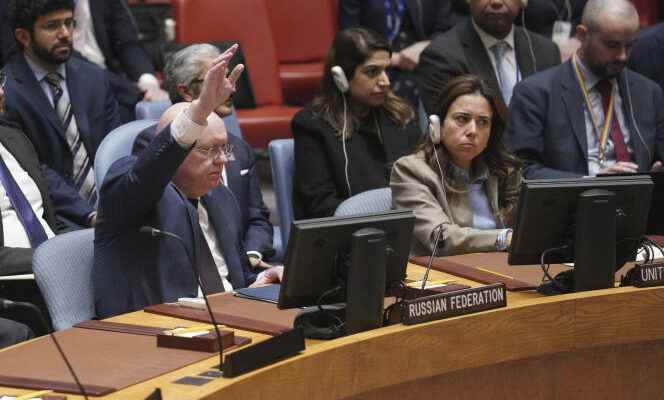Unsurprisingly, Russia used its veto on Friday, September 30, to prevent the adoption of a UN Security Council resolution condemning its annexation of four Ukrainian regions. The text will now be submitted to the General Assembly where all Member States have one vote.
Apart from the Russian veto, the resolution garnered ten votes in favor and four countries abstained – China, India, Brazil and Gabon – a result Westerners described as evidence of isolation of Russia.
The draft text seen by Agence France-Presse had been drafted before the signing on Friday by Russian President Vladimir Putin of the annexation documents for the regions of Donetsk, Luhansk, Zaporizhia and Kherson. This draft resolution condemned the “so-called illegal referendums” who cannot have “no validity” neither “to serve as a basis for an alteration of the status of these regions”.
“Pseudo-annexation”
Prepared by the United States and Albania, it called on all States and other organizations “not to recognize a pseudo-annexation” of the four regions and also demanded the withdrawal of Russian troops “immediately, completely and unconditionally”.
“You are intentionally forcing us to use our veto so that you can launch into lyrical flights about the fact that we are abusing our right”accused the Russian ambassador to the UN, Vassily Nebenzia, denouncing a “openly hostile action by the West”.
While the Russian veto was beyond doubt, eyes were on China, officially neutral but sometimes accused by Westerners of being too conciliatory with Russia. As in February the day after Russia invaded Ukraine, China abstained on Friday. “Any action by the Security Council must promote the improvement of the situation and the resolution of the crisis, rather than intensifying conflicts and exacerbating confrontation”commented Chinese Ambassador Zhang Jun, repeating that Beijing supports sovereignty and territorial integrity. ” From all countries “.
“Russia is more alone than ever”, estimated the French ambassador Nicolas de Rivière. Alone, of course, but “not as lonely as the West would like”, nuanced Richard Gowan, analyst at the NGO International Crisis Group. If the most important thing was for China to abstain, “the large number of abstentions suggests that the weariness observed regarding Ukraine is still at a high level”he added.
Crumbling
Westerners will now turn to the General Assembly, which should decide in the coming days. “We go to the General Assembly, where each country has one vote. The nations of the world will make it clear that it is illegal and simply unacceptable to try to redraw another country’s borders by force.”launched the American ambassador, Linda Thomas-Greenfield.
This future vote in the General Assembly, where none of the 193 member states has a veto, will make it possible to assess more precisely the degree of isolation of Russia, while some developing countries are annoyed that the West is concentrating all his attention to Ukraine.
In the spring, the General Assembly had voted three resolutions concerning the invasion of Ukraine by Russia, the third at the end of April had resulted in an erosion of international unity vis-à-vis Moscow.
On March 2, during a first historic vote, 141 countries had condemned the Russian invasion, five countries had voted against (Russia, Belarus, Syria, North Korea and Eritrea) and 35 had abstained.
On March 24, the Assembly called for unhindered humanitarian access and the protection of civilians in Ukraine: a vote which gathered 140 votes for, five against (the same) and 38 abstentions.
But on April 7, only 93 countries had supported Russia’s suspension from the UN Human Rights Council, 24 had opposed it and 58 had chosen to abstain.
The Nord Stream mystery remains
After the session on “referendums” annexation, the Council discussed, at Russia’s request, the four leaks affecting the Nord Stream gas pipelines in the Baltic Sea. While the origin and author of the explosions remain mysterious, Russia, to which all eyes have turned, has again suggested the involvement of the United States, which has denied any responsibility.
As for the UN, it “is unable to verify or confirm any of the reported details”said Navid Hanif, Under-Secretary-General for Economic Development, noting the risks that leaks pose to energy markets and the environment.
